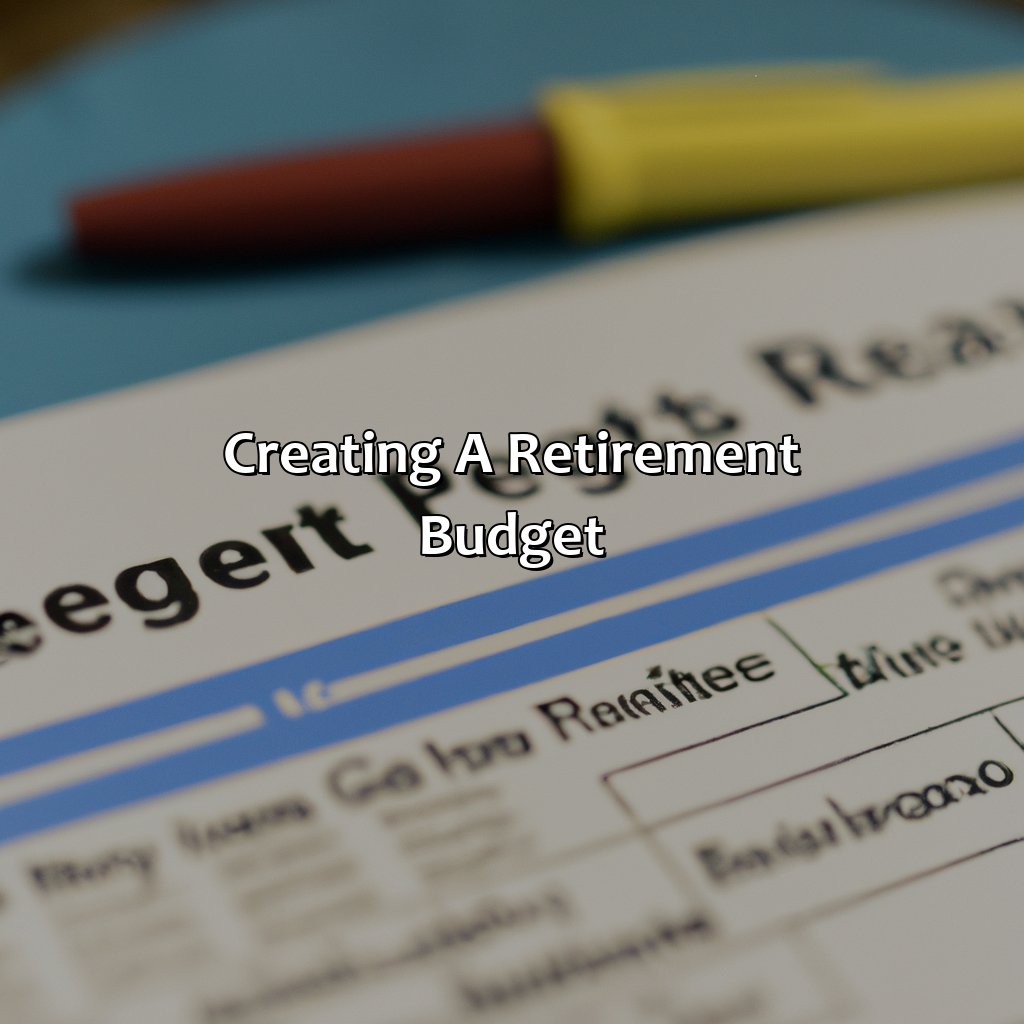How Much Can I Spend In Retirement?
Key Takeaway:
- Assessing Retirement Needs: Understanding how much money you’ll need in retirement can help you determine your overall savings goals and retirement budget.
- Creating a Retirement Budget: Calculating your retirement income and allocating your funds towards necessary expenses can help you estimate and control your overall expenses.
- Adjusting Retirement Budgets: It is important to monitor your retirement spending and make necessary adjustments to your budget in order to ensure financial security throughout your retirement years.
Are you concerned about how to manage your finances in retirement? You need to know how much you can spend and still meet your goals. With our helpful guide, you can learn the answer to the question, “How much can I spend in retirement?”
Planning for Retirement
Planning retirement? Ask yourself “How much can I spend in retirement?” To get started, you must comprehend your retirement requirements, income, expenditures, and objectives. Assessing Retirement Needs, Determining Retirement Income, Estimating Retirement Expenses, and Identifying Retirement Goals are vital sub-sections for addressing retirement planning.

Image credits: retiregenz.com by David Washington
Assessing Retirement Needs
Assessing the financial needs for retirement can be a daunting task. It requires an in-depth analysis of one’s current income, expenses, and lifestyle choices to determine the amount of money required during retirement. This process involves evaluating personal goals, expected longevity, inflation rates, and healthcare costs during retirement.
The first step in assessing retirement needs is to calculate expected living expense requirements based on projected increases in the cost of living. The next step is to determine the sources of retirement income including Social Security benefits, pensions or investment accounts like 401(k), IRA, etc. This information will give the estimated amount that could be spent from various sources every year.
Other important factors that must be considered are health care expenses during old age as they account for a significant portion of overall expenditure and risk and legacy planning if wanted. All these factors combined will help create a comprehensive plan that ensures adequate funds are available throughout your retired life.
Many individuals have misconceptions about retirement spending requirements leading to underspending or overspending post-retirement. A case in point; Mary saved much less than needed for her retirement years leading to inadequate finances later. By delving into your detailed retirements notes early enough with professional guidance can help mitigate this confusion surrounding Retirement Spending while ensuring one’s life well-being standards are not compromised.
Don’t worry about your retirement income, it’s not like you’ll be able to afford anything once you’re retired anyway.
Determining Retirement Income
Determining Your Retirement Income
Calculating retirement income can be daunting for individuals evaluating their budget. Planning ahead can assist in the decision-making process when determining your retirement funds using data on expenses, lifestyle, and retirement age. Without a plan in place, retirees may risk outliving their savings.
Considering factors that impact retirement income, such as healthcare costs and any unexpected expenses is critical. Analysing anticipated earnings from employment in tandem with potential social security benefits and other forms of investment income can provide a better estimate of how much you can afford to spend while retired.
Focusing on the Future
To ensure a stable financial future, it is essential to consider investing in long-term strategies such as equities or other growth-oriented portfolios. People need reliable returns they can count on daily during challenged financial times. In addition to this strategy, exploring several income sources is crucial for maintaining consistent payments while enjoying life after retirement.
Effective Suggestion Techniques
Retirement planning entails diligently saving towards monetary compensation goals that enable needed flexibility in spending money post-career years. A great way to create an ongoing revenue stream is by developing multiple passive income streams such as dividend-generating stocks or rental properties. Consistency is key when generating cash flow; therefore avoid taking risky propositions that could ruin investment integrity over time. Ensuring knowledgeable investment decisions will lead you down the path of happy retirement years without financial strain worrying about meeting baseline expenses regularly.
Retirement expenses are like a box of chocolates – you never know what kind of dentist bill you’re going to get.
Estimating Retirement Expenses
Retirement expenditure estimation requires a thorough understanding of one’s lifestyle, preferences and expectations. Crucial considerations include healthcare expenses, housing options and entertainment choices. It is important to regularly review one’s spending plan to keep up with changing circumstances.
Another aspect to consider is the inflation rate that can impact a retiree’s purchasing power over time. To accurately estimate retirement expenses, it is essential to consider all potential factors and consult a financial advisor if required. Keeping track of expense patterns in one’s pre-retirement years could also assist in planning for post-retirement life.
It is worth noting that according to a survey by GoBankingRates, 42% of Americans have less than $10,000 saved for retirement. This highlights the importance of careful planning and early investment in securing a comfortable future retirement.
I already have a retirement goal – to be able to afford a J.Lo-level skincare routine without breaking the bank.
Identifying Retirement Goals
Determining Retirement Objectives Through Strategic Planning
To adequately prepare for retirement, it is essential to establish clear objectives that align with one’s lifestyle. This process involves identifying primary and secondary financial goals and mapping them out through a strategic plan. By doing so, individuals can ensure they have enough funds to meet their requirements while enjoying their golden years.
Effective planning should encompass various aspects of retirement living, such as healthcare costs, leisure activities, family support expenses, among others. With a clear understanding of these lifestyle areas, adequate measures can be set in place to help achieve one’s objectives efficiently.
Having established clear goals with anticipated future expenses clearly defined and assessed against the available financial means; retirees can make well-informed decisions on prudent investment opportunities. They can also ensure they do not spend beyond the allocated budget that supports their desired standard of living throughout retirement.
An example is the story of John, who retired without a proper plan and thus spent his time moving from one expense to another without any meaningful destination or satisfaction. He lived in uncertainty and despite having a healthy retirement pot lost most investments due to lack of focus and direction. Unfortunately for him, his carefree attitude towards retirement sent him back into active job search mode when he realized he could barely survive based on his depleted portfolio. A comprehensive plan would have made it easier than relying on hunches or trial-and-error tactics during such critical times of life.
Retirement budgeting: because eating canned tuna every day is only fun for the first week.
Creating a Retirement Budget
To make a retirement budget, you have to comprehend your current and future finance. Check your retirement savings options. Estimate your future retirement income. All this will support you make the right allocations for a financially stable retirement.

Image credits: retiregenz.com by Yuval Washington
Understanding Retirement Savings Options
Retirement Savings Options can be overwhelming, but understanding them is crucial for a successful retirement plan. It’s essential to explore options such as 401(k), IRAs, and Roth IRAs and understand the tax implications of each.
A 401(k) allows contributions up to $19,500 annually with an additional catch-up contribution of $6,500 for those 50 or over. Traditional IRAs and Roth IRAs provide various benefits, including tax-deferred savings or tax-free distributions depending on eligibility.
Social Security may also be a source of retirement income after contributing throughout your working years. Maximizing these options will depend on an individual’s goals and priorities.
It’s important to act now instead of waiting until later as delaying can negatively impact future finances. Taking control of one’s finances now can lead to more peace of mind during retirement years.
Retirement income calculation is a lot like math class – confusing, stressful and makes you question all your life choices.
Calculating Retirement Income
Retirement budget is an essential factor in planning one’s retirement. The amount of income one has saved during their working years and the expected expenses after retirement determine how much money they can spend during retirement. Here’s a guide on how to calculate your retirement income.
- Determine Your Retirement Expenses – List down all your expected expenses, such as housing, healthcare, transportation, groceries, etc., and calculate the total amount you need each month.
- Estimate Your Retirement Income – Calculate the income you’ll receive from pensions, social security benefits, investments, and savings during retirement.
- Calculate Your Shortfall or Surplus – Subtract your expected expenses from your estimated income to determine if you have enough money for a comfortable retirement or if there’s a shortfall.
- Adjust Your Retirement Plan – If there’s a shortfall, explore different options such as reducing expenses or increase savings to close the gap.
It is important to consider inflation while calculating your retirement budget as it can significantly affect your purchasing power. Make sure to review and adjust your expenses annually to accommodate any changing trends.
Creating a reliable retirement budget is crucial in ensuring a financially sound post-retirement life; managing debt and creating an emergency fund can help in achieving this goal. Don’t let fear of missing out on fun activities later in life drive impulsive financial decisions now; plan carefully for a stress-free future.
Retirement funds are like a giant game of Jenga – one wrong move and the whole thing could come crashing down.
Allocating Retirement Funds
When it comes to managing finances in retirement, one must be mindful of how to best allocate their funds. It’s important to prioritize essential expenses such as housing, healthcare, and transportation before allocating discretionary funds towards leisure activities.
Furthermore, determining a sustainable withdrawal rate is crucial in ensuring that retirees don’t deplete their savings prematurely. There are various methods for calculating a safe withdrawal rate based on factors such as inflation and investment returns.
One helpful strategy is to create a retirement budget that outlines all sources of income and expenses. This can help retirees identify areas where they may need to cut back or adjust spending habits.
Overall, careful planning and financial management can go a long way in ensuring a comfortable and secure retirement. By prioritizing essential expenses and creating a realistic budget, retirees can make the most out of their retirement savings.
Retirement budgets are like diets – easy to make but harder to stick to, especially when the cookie jar is calling your name.
Adjusting Retirement Budgets
How Much Can I Spend in Retirement? Need adjusting? Check out the sub-sections ‘Monitoring Retirement Spending’ & ‘Making Changes to Retirement Budgets’.
Monitor your spending. Identify areas for adjustments. Make changes to your budget. Ensure your funds last long!

Image credits: retiregenz.com by James Arnold
Monitoring Retirement Spending
Retirement Budgets – Keeping Tabs on Your Spending
The key to enjoying a comfortable retirement that is both fulfilling and financially feasible is keeping a close eye on one’s spending. It is essential to establish the right balance between financial stability and indulging in activities that bring joy.
To start, set an annual budget and divide it into monthly limits. Use technology such as budgeting apps or spreadsheets to track expenses accurately. Monitor major purchases like home repairs or travel expenses, and make adjustments when necessary.
Beyond the basics of tracking expenses, it’s important also to consider future needs such as healthcare costs or long-term care. These expenses can easily slip under the radar but will significantly impact your retirement budget in the long run.
Finally, don’t forget about wish-list items like upgrading your car or taking an extended vacation. While you may need to adjust your spending elsewhere, it’s crucial to keep things in perspective by including these items in your budget.
Take charge of your retirement finances today by creating a comprehensive plan that balances realistic spending with future needs and wish-list items. By doing so, you’ll be able to live out a retirement full of purpose and joy while avoiding unnecessary financial stress.
Retirement budgets are like clay – you can shape them however you want, but if you’re not careful, they’ll crumble in your hands.
Making Changes to Retirement Budgets
As retirees progress through retirement, it is natural that adjustments need to be made to their budgets. This involves taking a closer look at finances and finding areas where spending can be moderated or reduced to accommodate new circumstances. Retirees should also consider their long-term financial goals and weigh these against current expenses to make informed changes.
One way of adjusting retirement budgets is by analyzing monthly spending patterns. By reviewing bank statements and credit card bills, retirees can determine areas of unnecessary expenses and eliminate them accordingly. Additionally, retirees may consider downsizing their homes or relocating to an area with lower living costs, which can translate into significant savings over time.
Retirees should also develop a realistic understanding of what they want out of retirement and adjust their budget based on these goals accordingly. Some may want to travel the world, while others may want to devote more time to hobbies or charitable causes. Whatever the aspirations may be, proper budgeting enables retirees to sustainably pursue these endeavors.
True fact: A study published by the Employee Benefit Research Institute found that only 20% of workers are very confident about having enough money for a comfortable retirement.
Some Facts About How Much Can I Spend in Retirement:
- ✅ Your retirement spending will depend on your lifestyle, expenses, and other factors. (Source: The Balance)
- ✅ Experts usually recommend aiming for a retirement income that is 80% of your pre-retirement income. (Source: NerdWallet)
- ✅ You can estimate your retirement expenses using various online tools and calculators. (Source: AARP)
- ✅ A popular rule of thumb for retirement withdrawals is the 4% rule. (Source: CNBC)
- ✅ Your retirement spending may change over time, so it’s important to regularly review and adjust your financial plan. (Source: Investopedia)
FAQs about How Much Can I Spend In Retirement?
How much can I spend in retirement?
One of the biggest questions for retirees is how much they can spend in retirement without running out of money. There’s no exact answer, as it depends on a variety of factors, such as your retirement savings, your fixed expenses, and your lifestyle choices.
What’s a safe withdrawal rate to use?
Most financial advisors recommend a 4% withdrawal rate to balance sustainability and flexibility. This means that if you have $1 million in retirement savings, you can safely withdraw $40,000 per year in retirement. However, there are different approaches that can be used based on your individual circumstances.
What’s the 80% rule for retirement spending?
The 80% rule suggests that retirees should aim to replace 80% of their pre-retirement income. This assumes that you’ll have fewer expenses in retirement, such as mortgage payments and work-related expenses. However, your actual spending may vary based on your lifestyle and other factors.
What if I have unexpected expenses during retirement?
It’s important to plan for unexpected expenses in retirement, such as healthcare costs or major home repairs. One approach is to have an emergency fund with 3-6 months of expenses to cover unexpected bills. You may also want to consider purchasing long-term care insurance to protect against major healthcare costs in the future.
What about inflation in retirement spending?
Inflation can have a significant impact on retirement spending over time. It’s important to build in a cushion to account for inflation when planning your retirement spending. One approach is to use a retirement calculator that factors in inflation to project your future expenses and income.
Can I still enjoy my retirement while being financially responsible?
Yes, you can still enjoy your retirement while being financially responsible. It’s all about finding a balance between spending and saving, based on your individual goals and circumstances. Financial planning and budgeting can help you maximize your retirement savings while still having fun and enjoying your golden years.







